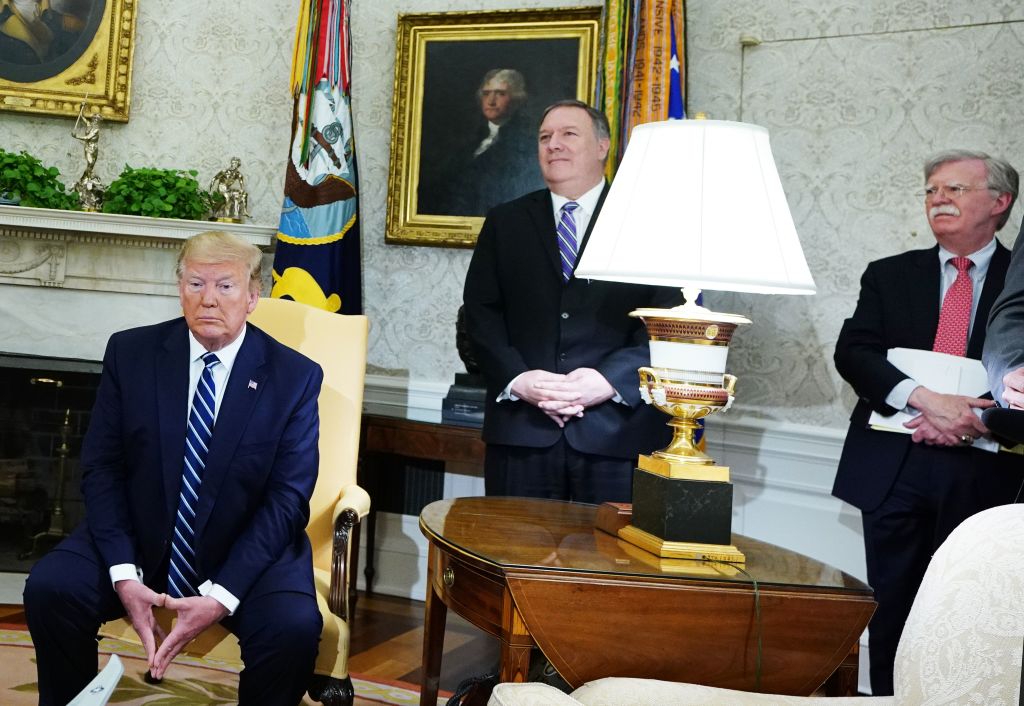It's not clear why Trump announced his secret, failed, ill-timed Camp David Taliban summit


A free daily email with the biggest news stories of the day – and the best features from TheWeek.com
You are now subscribed
Your newsletter sign-up was successful
The secret plan for President Trump to invite Taliban leaders to Washington to sign a peace accord took shape during a meeting in the Situation Room on Aug. 30, The New York Times reports. Secretary of State Mike Pompeo and his Afghanistan negotiator, Zalmay Khalilzad, backed the underlying peace plan Khalilzad had tentatively cemented with the Taliban after nearly a year of talks; National Security Adviser John Bolton was opposed. Almost nobody else knew about Trump's plan to host the Taliban until he tweeted the summit had been canceled Saturday evening.
In the first few days of September, Trump decided "he would not only bring the Taliban to Washington, but to Camp David, the crown jewel of the American presidency," the Times reports. "The leaders of a rugged militant organization deemed terrorists by the United States would be hosted in the mountain getaway used for presidents, prime ministers, and kings just three days before the anniversary of the Sept. 11, 2001, attacks." Trump also decided to invite Afghan President Ashraf Ghani, whose government was not party to the talks. "The usual National Security Council process was dispensed with; only a small circle of advisers was even clued in," the Times adds.
Before the plan fell apart on Thursday night, The Washington Post reports, "Trump was the main person pushing for the Camp David meeting," believing "his personal style can persuade anyone." Ghani agreed to come, and the Taliban did, too, on the condition the deal was signed before the summit. That became a "fundamental dividing point contributing to the collapse of the talks," the Times reports, since "Trump wanted to be the dealmaker who would put the final parts together himself, or at least be perceived to be."
The Week
Escape your echo chamber. Get the facts behind the news, plus analysis from multiple perspectives.

Sign up for The Week's Free Newsletters
From our morning news briefing to a weekly Good News Newsletter, get the best of The Week delivered directly to your inbox.
From our morning news briefing to a weekly Good News Newsletter, get the best of The Week delivered directly to your inbox.
Trump's disclosure of the failed summit "surprised not only many national security officials across the government but even some of the few who were part of the deliberations," the Times reports, and several officials said "there was no reason for Mr. Trump to reveal what had happened." A senior administration official told the Post that Trump decided to unveil the talks "to control the narrative." Why he felt he had to do that is unclear, but the narrative was not well-received — inviting the Taliban to Camp David the week of 9/11 earned rare bipartisan condemnation.
A free daily email with the biggest news stories of the day – and the best features from TheWeek.com
Peter has worked as a news and culture writer and editor at The Week since the site's launch in 2008. He covers politics, world affairs, religion and cultural currents. His journalism career began as a copy editor at a financial newswire and has included editorial positions at The New York Times Magazine, Facts on File, and Oregon State University.
-
 Corruption: The spy sheikh and the president
Corruption: The spy sheikh and the presidentFeature Trump is at the center of another scandal
-
 Putin’s shadow war
Putin’s shadow warFeature The Kremlin is waging a campaign of sabotage and subversion against Ukraine’s allies in the West
-
 Media: Why did Bezos gut ‘The Washington Post’?
Media: Why did Bezos gut ‘The Washington Post’?Feature Possibilities include to curry favor with Trump or to try to end financial losses
-
 Judge orders Washington slavery exhibit restored
Judge orders Washington slavery exhibit restoredSpeed Read The Trump administration took down displays about slavery at the President’s House Site in Philadelphia
-
 Hyatt chair joins growing list of Epstein files losers
Hyatt chair joins growing list of Epstein files losersSpeed Read Thomas Pritzker stepped down as executive chair of the Hyatt Hotels Corporation over his ties with Jeffrey Epstein and Ghislaine Maxwell
-
 Judge blocks Hegseth from punishing Kelly over video
Judge blocks Hegseth from punishing Kelly over videoSpeed Read Defense Secretary Pete Hegseth pushed for the senator to be demoted over a video in which he reminds military officials they should refuse illegal orders
-
 Trump’s EPA kills legal basis for federal climate policy
Trump’s EPA kills legal basis for federal climate policySpeed Read The government’s authority to regulate several planet-warming pollutants has been repealed
-
 House votes to end Trump’s Canada tariffs
House votes to end Trump’s Canada tariffsSpeed Read Six Republicans joined with Democrats to repeal the president’s tariffs
-
 Bondi, Democrats clash over Epstein in hearing
Bondi, Democrats clash over Epstein in hearingSpeed Read Attorney General Pam Bondi ignored survivors of convicted sex offender Jeffrey Epstein and demanded that Democrats apologize to Trump
-
 El Paso airspace closure tied to FAA-Pentagon standoff
El Paso airspace closure tied to FAA-Pentagon standoffSpeed Read The closure in the Texas border city stemmed from disagreements between the Federal Aviation Administration and Pentagon officials over drone-related tests
-
 Judge blocks Trump suit for Michigan voter rolls
Judge blocks Trump suit for Michigan voter rollsSpeed Read A Trump-appointed federal judge rejected the administration’s demand for voters’ personal data
